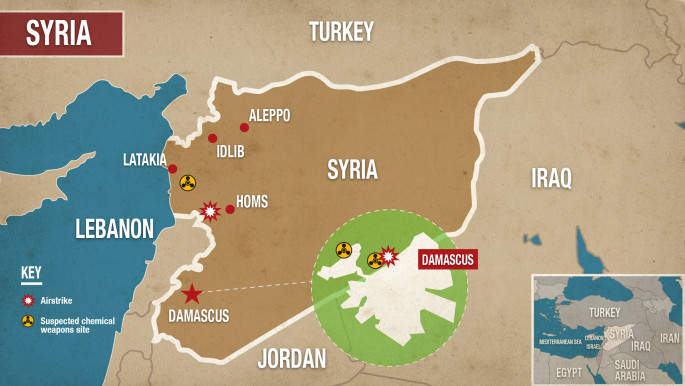France: 'Large parts of Syria's chemical stockpile destroyed'
Missile strikes carried out overnight in Syria by the US, UK and France have destroyed "a large part" of Damascus' chemical weapons stockpiles, said the French Foreign Minister Jean-Yves Le Drian on Saturday.
Speaking to BFM television, Le Drian said: "a large part of its chemical arsenal has been destroyed".
He added that "a lot has been destroyed in last night's strikes".
Le Drian added that France had "solid intelligence" that the Assad regime was behind the suspected gas attack in the besieged city of Douma, which left dozens dead.
At least 49 people died in the suspected chemical attack in Eastern Ghouta according to medical groups and rescuers, with other estimates reaching over a hundred.
Graphic images and videos emerged on social media following Douma's gas attack, showing children struggling to breathe and entire families who had succumbed to the attack on the floors of underground shelters.
Syrian President Bashar al-Assad and his supporters have consistently claimed that chemical and other attacks were staged, and that an army of actors including children has been trained to fake injury on a massive scale.
Others have said the rebels carried out the attack, but Western powers including France say they have ample evidence to suggest the killings were done by the regime.
The Syrian regime has repeatedly used chemical weapons during the war, with Human Rights Watch claiming Assad's forces were responsible for the majority of 85 confirmed chemical weapons attacks.
Le Drian cited "overwhelming testimony" and extensive analysis by French intelligence services and laboratories that pointed to the Assad regime involvement.
"The analyses are not yet finished... but will allow us to identify all the gases. There was chlorine, that's certain," and preliminary evidence points to other gases as well, he said.
Russian Foreign Minister Sergei Lavrov had claimed that Moscow had "irrefutable" evidence that the deadly chemical weapons attack in Syria's Douma was staged with the help of a foreign secret service, naming the UK.
Damascus has denied using any chemical weapons in the seven-year conflict, blaming the rebels on using it on themselves.
Long-time ally Russia has also denied the use of chemical weapons by the Syrian regime and called into question the results of the OPCW inquiries with officials in Moscow claiming that the rebels staged the attacks to discredit the Syrian government and whip up international condemnation.
Earlier in the year, a report linked Syria's largest sarin nerve agent attack in August 2013, which left hundreds dead, to the Syrian regime chemical stockpile.
Damascus joined the OPCW and agreed to destroy its 1,300-tonne stockpile of industrial munition following a US-Russian deal. Despite agreeing to the deal, inspectors have found evidence of an ongoing chemical weapons programme in the country, including systematic use of chlorine barrel bombs and sarin.
Le Drian warned that France would not hesitate to strike Syria again in case of further chemical attacks.
"On the question of chemical weapons, there is a red line that must not be crossed, and if it should be crossed again, there will be another intervention," Le Drian said.
"But I think the lesson has been learned."
"The point is to make sure there is no proliferation of chemical weapons," he added. "The point was not to impact the regime's allies, nor even to impact the institutional functioning of the Syrian regime."
Le Drian added that the French President Emmanuel Macron still planned to travel to Russia for talks with President Vladimir Putin in May, and urged Moscow to work constructively on applying US Security Council resolutions on Syria.
"We have to keep talking with Russia, and Russia needs to realise that it has voted in favour of UN security resolutions (on Syria) and that they must be applied today, and not be carried away by the barbarity of Bashar al-Assad," he said.
Eastern Ghouta has been under a ruthless seven-week assault that devastated the area and killed more than 1,700 civilians, allowing Assad's forces to gain control of more than 90 percent of the former rebel stronghold.
Around 500,000 people have died and millions made homeless in seven years of fighting in Syria, which was sparked when regime forces brutally put down peaceful protests in 2011.





 Follow the Middle East's top stories in English at The New Arab on Google News
Follow the Middle East's top stories in English at The New Arab on Google News


